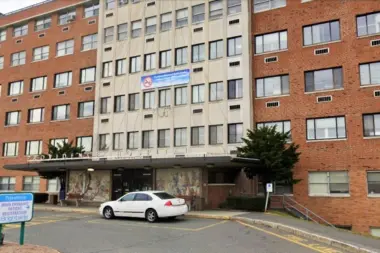Providence has been good to me over the years. It was always my go to when I needed to stop. Staff were always nice when I treated them with respect. I love providence, they have saved my life several several times.
About Providence Behavioral Health Hospital
Not everyone needs a 30+ day stay to address their mental health concerns, nor can everyone afford to take extended time off for treatment. What I like about MiraVista’s inpatient program is that it’s focused on rapid stabilization, meaning clients are introduced to recovery concepts and practices over one or two weeks. From there, they can continue treatment with other community services or the facility’s own outpatient program. Clients who do require a longer, more intensive stay may be referred to another facility and program.
MiraVista Behavioral Health Center accepts Medicare, MassHealth, and commercial insurance plans. They also have a sliding fee scale and discounts based on your family size and income.
Latest Reviews
Rehab Score
Gallery


Accepted Insurance
Other Forms of Payment
Medicaid is a state based program that helps lower-income individuals and families pay for healthcare. Medicaid covers addiction treatment so those enrolled can use their coverage to pay for rehab. When a program accepts Medicaid the client often pays very little or nothing out of their own pocket.
Private insurance refers to any kind of healthcare coverage that isn't from the state or federal government. This includes individual and family plans offered by an employer or purchased from the Insurance Marketplace. Every plan will have different requirements and out of pocket costs so be sure to get the full details before you start treatment.
Self-pay involves paying for treatment out of your own pocket. You can use savings or credit, get a personal loan, or receive help from family and friends to fund your treatment. If you don't have insurance or your insurance plan doesn't cover a specific program, self-pay can help ensure you still get the care you need.
Financial aid can take many forms. Centers may have grants or scholarships available to clients who meet eligibility requirements. Programs that receive SAMHSA grants may have financial aid available for those who need treatment as well. Grants and scholarships can help you pai for treatment without having to repay.
Medicare is a federal program that provides health insurance for those 65 and older. It also serves people under 65 with chronic and disabling health challenges. To use Medicare for addiction treatment you need to find a program that accepts Medicare and is in network with your plan. Out of pocket costs and preauthorization requirements vary, so always check with your provider.
Military members, veterans, and eligible dependents have access to specific insurance programs that help them get the care they need. TRICARE and VA insurance can help you access low cost or no cost addiction and mental health treatment. Programs that accept military insurance often have targeted treatment focused on the unique challenges military members, veterans, and their families face.
Addiction Treatments
Levels of Care
Providence Behavioral Health Hospital provides outpatient substance abuse treatment services to the residents of Western Massachusetts. These services include: individual, family and group outpatient substance abuse counseling for people who are addicted to drugs or alcohol, and counseling for individuals who are affected by the substance abuse of a relative or other loved one.
At Providence Behavioral Health Hospital in Holyoke, their acute treatment services / inpatient substance use disorder treatment program can put you on the right track with the focused treatment, education, and tools you need to safely stop using drugs or alcohol and live a productive, successful and satisfying life. For adults who are in crisis and experiencing severe mental health symptoms, the Adult Psychiatric Unit at Providence Behavioral Health Hospital provides short-term admission for intensive diagnostic evaluation and treatment.
Their Enhanced Acute Treatment Service provides a broad range of service, including substance withdrawal management under careful medical supervision and psychiatric evaluation and treatment. Most individuals receiving treatment are experiencing symptoms related to stopping opioids (heroin or prescription painkillers) or alcohol, benzodiazepines, or other sedatives and all have co-occurring mental health disorders.
At certain points in the recovery process, it's important to have support available 24/7. 24-hour clinical care offers a safe environment in which to recover from drug or alcohol addiction in peace, knowing medical detox and other treatment will happen with professionals on hand.
Pathways, an intensive outpatient treatment program for any person suffering from the negative consequences of substance abuse or chemical dependency. The program allows individuals who may need more intensive services than traditional outpatient treatment to continue to address their substance abuse in a structured program 3 to 5 sessions per week while continuing to live in the community.
Intervention services helps family or friends of addicts stage an intervention, which is a meeting in which loved ones share their concerns and attempt to get an addict into treatment. Professional intervention specialists can help loved ones organize, gather, and communicate with an addict. They can guide intervention participants in describing the damage the addict's behavior is causing and that outside help is necessary to address the addiction. The ideal outcome of an intervention is for the addict to go to rehab and get the help they need.
To help their patients manage their illness after they’re discharged from the hospital, they offer each patient care throughout their continuum with linkage to their intensive outpatient programs, traditional outpatient services and opioid treatment programs for treatment with methadone or buprenorphine. Patients are linked with community providers who can provide the aftercare services they need to maintain and add to the gains they’ve made in their program. These providers include primary care physicians, mental health providers, case management services, and longer-term residential treatment.
Treatments
The goal of treatment for alcoholism is abstinence. Those with poor social support, poor motivation, or psychiatric disorders tend to relapse within a few years of treatment. For these people, success is measured by longer periods of abstinence, reduced use of alcohol, better health, and improved social functioning. Recovery and Maintenance are usually based on 12 step programs and AA meetings.
Addiction is a highly complex problem, and drug rehab in Massachusetts is often necessary to address it. These programs treat physical, mental, and relational issues that are involved. Treatment empowers individuals to manage these issues without the use of drugs.
When someone is struggling with both drug or alcohol use and mental health symptoms, treating both illnesses at the same time can improve the chances of success on both fronts. That’s why Providence Behavioral Health Hospital offers a comprehensive Enhanced Acute Treatment Service for individuals who have these co-occurring issues – providing a vital first step in patients’ ongoing recovery process.
A combined mental health and substance abuse rehab has the staff and resources available to handle individuals with both mental health and substance abuse issues. It can be challenging to determine where a specific symptom stems from (a mental health issue or an issue related to substance abuse), so mental health and substance abuse professionals are helpful in detangling symptoms and keeping treatment on track.
Opioid rehabs specialize in supporting those recovering from opioid addiction. They treat those suffering from addiction to illegal opioids like heroin, as well as prescription drugs like oxycodone. These centers typically combine both physical as well as mental and emotional support to help stop addiction. Physical support often includes medical detox and subsequent medical support (including medication), and mental support includes in-depth therapy to address the underlying causes of addiction.
Programs
Adult rehab programs include therapies tailored to each client's specific needs, goals, and recovery progress. They are tailored to the specific challenges adult clients may face, including family and work pressures and commitments. From inpatient and residential treatment to various levels of outpatient services, there are many options available. Some facilities also help adults work through co-occurring conditions, like anxiety, that can accompany addiction.
Young adulthood can be an exciting, yet difficult, time of transition. Individuals in their late teens to mid-20s face unique stressors related to school, jobs, families, and social circles, which can lead to a rise in substance use. Rehab centers with dedicated young adult programs will include activities and amenities that cater to this age group, with an emphasis on specialized counseling, peer socialization, and ongoing aftercare.
Clinical Services
Cognitive Behavioral Therapy (CBT) is a therapy modality that focuses on the relationship between one's thoughts, feelings, and behaviors. It is used to establish and allow for healthy responses to thoughts and feelings (instead of unhealthy responses, like using drugs or alcohol). CBT has been proven effective for recovering addicts of all kinds, and is used to strengthen a patient's own self-awareness and ability to self-regulate. CBT allows individuals to monitor their own emotional state, become more adept at communicating with others, and manage stress without needing to engage in substance abuse.
Whether a marriage or other committed relationship, an intimate partnership is one of the most important aspects of a person's life. Drug and alcohol addiction affects both members of a couple in deep and meaningful ways, as does rehab and recovery. Couples therapy and other couples-focused treatment programs are significant parts of exploring triggers of addiction, as well as learning how to build healthy patterns to support ongoing sobriety.
Experiential therapy is a form of therapy in which clients are encouraged to surface and work through subconscious issues by engaging in real-time experiences. Experiential therapy departs from traditional talk therapy by involving the body, and having clients engage in activities, movements, and physical and emotional expression. This can involve role-play or using props (which can include other people). Experiential therapy can help people process trauma, memories, and emotion quickly, deeply, and in a lasting fashion, leading to substantial and impactful healing.
Research clearly demonstrates that recovery is far more successful and sustainable when loved ones like family members participate in rehab and substance abuse treatment. Genetic factors may be at play when it comes to drug and alcohol addiction, as well as mental health issues. Family dynamics often play a critical role in addiction triggers, and if properly educated, family members can be a strong source of support when it comes to rehabilitation.
Group therapy is any therapeutic work that happens in a group (not one-on-one). There are a number of different group therapy modalities, including support groups, experiential therapy, psycho-education, and more. Group therapy involves treatment as well as processing interaction between group members.
In individual therapy, a patient meets one-on-one with a trained psychologist or counselor. Therapy is a pivotal part of effective substance abuse treatment, as it often covers root causes of addiction, including challenges faced by the patient in their social, family, and work/school life.
Nutrition therapy, aka medical nutrition therapy (MNT), is a way of treating physical, emotional, and medical conditions through diet. Specific dietary plans are designed by professional nutritionists or registered dietitians, and patients follow them in order to positively affect their physical and mental health.
Trauma therapy addresses traumatic incidents from a client's past that are likely affecting their present-day experience. Trauma is often one of the primary triggers and potential causes of addiction, and can stem from child sexual abuse, domestic violence, having a parent with a mental illness, losing one or both parents at a young age, teenage or adult sexual assault, or any number of other factors. The purpose of trauma therapy is to allow a patient to process trauma and move through and past it, with the help of trained and compassionate mental health professionals.
Amenities
-
Private Setting
Staff & Accreditations
Staff

Michael P. Krupa, Dr.
CEO Emeritus & Founder

Francis "Fran" Sauvageau
CEO

Joseph Doolin, MBA, MS
Executive VP

Shelley Zimmerman
Hospital Administrator

Debbie Harris
CFO

Darlene V. Sejour, RN, MSN
Chief Nursing Officer

Theresa Byrd
Senior Director of Human Resources

Leslie Rivera Cruz
Director of Intake
Accreditations

The Joint Commission, formerly known as JCAHO, is a nonprofit organization that accredits rehab organizations and programs. Founded in 1951, the Joint Commision's mission is to improve the quality of patient care and demonstrating the quality of patient care.
Joint Commission Accreditation: Yes
